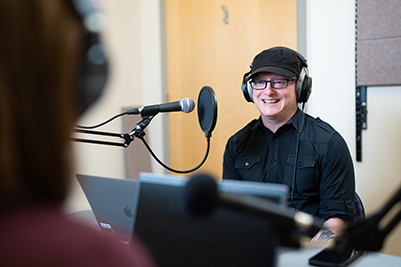Education, Outreach, and Partnerships

The Oregon Healthy Workforce Center (OHWC) is actively engaged in making the Center’s work accessible to practitioners and organizations who could benefit from implementing Total Worker Health®-informed and evidence-based practices. Our work is closely informed by our regional stakeholders who help us understand the needs of workers across industries with whom we partner to share our resources.
Outreach and partnership building
We develop stakeholder partnerships and collaborative opportunities for moving Total Worker Health (TWH)-based practices into action.
- Presence at regional and national academic, safety, and HR/wellness/benefits conferences. Learn more about our conference outreach.
- Partnerships and outreach are critical to OHWC's success. Learn more about our partnerships.
- Annual Report: that details the activities, outreach and partnership accomplishments. Read our annual reports.
Education
We create educational opportunities geared toward building capacity for TWH research and practice.
Hosted by OHWC every other year, each three-day Summer Institute is geared toward highlighting specific topics and sharing current research around a specific theme.
This long-standing one-day event shines light on pressing topics and is geared toward providing practitioners with recommended practices.
An example of what we can accomplish by joining forces with our partners, the Total Worker Health Curriculum is a landmark effort of the Oregon Total Worker Health Alliance, geared toward building capacity among practitioners to implement the TWH approach within their organizations. Click to learn more.
A continuing education program for occupational health and safety professionals, this online course is offered by the University of Washington's Northwest Center for Occupational Health and Safety in collaboration with OHWC, Portland State University Occupational Health Psychology program, and the TWH Program. Learn more here and download a flyer.
Dissemination and implementation
We create and disseminate educational and evidence-based resources that organizations can implement. A key goal of OHWC’s collective efforts is to move research to practice (R2P) and to this end, we make sure our resources are well-positioned for real-world implementation within organizations.
Supportive Workplaces - The Supportive Workplaces website is OHWC's hub for evidence-based training programs to support workplace safety, health and well-being.
Oregon and the Workplace - The Oregon and the Workplace blog features the latest research from OHWC as well as news and other updates in the fields of occupational health, safety and well-being.
What's Work Got to Do with It? - The What's Work Got to Do with It podcast explores the latest news and science related to occupational health, safety and well-being.
Practitioner Resource Library - OHWC develops self-guided training and resources for workers, which are available on our Practitioner Resource Library page.
Learn more about our work

Newsletter
Explore professional development opportunities, the latest updates from the Oregon Healthy Workforce Center and the Occupational Public Health Program, a research snapshot, and upcoming occupational health-focused events.

Blog
The Oregon and the Workplace Blog features the latest from OccHealthSci research, professional development opportunities, and valuable insights from disciplines associated with occupational health, safety, and well-being.

Podcast
The What's Work Got to Do with It podcast, produced by OccHealthSci, brings together occupational health, safety, and well-being experts to discuss the latest topics relating to worker health, well-being, and safety in Oregon and beyond.